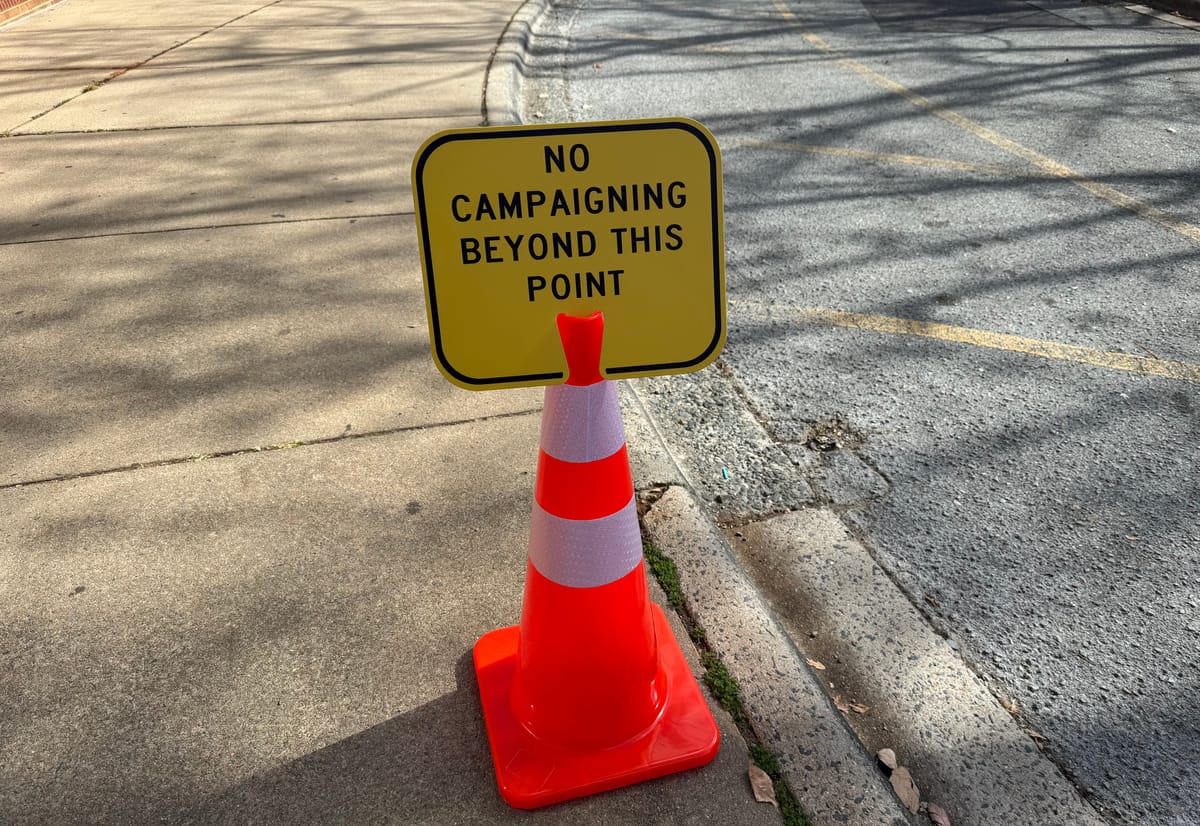So, what will happen?
I've spent the last eight days travelling around four of the seven US 'swing states'. So what will happen? There are reasons to be quietly optimistic if, like me, you're hoping for a Harris/Walz win.

I've spent the last eight days travelling around four of the seven 'swing states' in the US - the states that are most likely to determine the outcome of the presidential race, because their electorates are so closely divided between Democrats and Republicans. I visited Pennsylvania, Wisconsin and Georgia, and I'm now in North Carolina, where I visited a polling station and will be going to a Democratic watch party.
It's been one hell of a ride. I've followed a lot of US election campaigns, and none have been as unpredictable, chaotic, divisive and frankly, scary, as this one. I visited Democrat-leaning states and Republican leaning ones, I attended a Harris rally and a Trump rally, I watched the political coverage on right-wing Fox News and liberal MSNBC, I saw hundreds of campaign ads, and I spoke to experts and regular Americans. I even met President Bartlet from the West Wing.
The question I'm asked all the time (by family and friends in Europe anyway): so, what will happen? The easiest and probably only honest answer is to say I don't know. But there are reasons to be quietly optimistic if, like me, you're hoping for a Harris/Walz win.
1) Polls. Although the polls have been tightening in Trump's favour in recent weeks, there have been signs in the last few days of a possible shift in the opposite direction. On Saturday there was the shock poll in Iowa that showed Harris three points ahead of Trump in what is considered to be a solidly Republican state. The independent pollster who carried out the poll is considered to be one of the best in the country. Donald Trump took the lead in the RealClearPolitics polling average on 26 October, but Harris took it back on Monday.
2) Turnout. In a race as close as this one, it's all about who can turn out the most voters. The Harris campaign has run an exceptional ground-game, with tens of thousands of volunteers across the country knocking on doors and operating phone banks. I'm currently staying at the home of registered Democrats in North Carolina, and their son just received a hand-written postcard urging him to come out and vote (they can see he hasn't been yet). Trump has outsourced the door-knocking to commercial parties, who will inevitably be less committed (and there have been technical and other issues, too).
3) Money. The Harris campaign massively out-fundraised the Trump campaign. The Biden/Harris campaign raised almost 1 billion dollars since January last year, whereas the Trump campaign raised just under 400 million. Spending by Super PACs (political action committees supposedly independent of the candidates) and other outside groups far outstrips these numbers, but direct fundraising is a good indicator of the level of enthusiasm for the candidates and their campaigns. Democrats and Democratic-supporting groups have been winning the ad wars too, outspending Republicans by 5 to 4.1 billion dollars.
4) Issues. There's every sign that the twin issues of defending abortion rights and protecting US democracy are mobilising new voters and persuading existing voters to move towards the Democrats. Polls show that abortion is the top issue for female voters under 30; the defence of US democracy is ranked as the second most important issue by all voters, after the economy. On the economy, Harris has been closing the gap with Trump.
These are reasons to be optimistic about the outcome of the election, and I suspect by themselves would be enough to give Harris a clear advantage in the popular vote. Assuming this is the case, where could things still go wrong from the Democrats' point of view?
1) The Electoral College. The popular vote doesn't necessarily translate into an election victory. For that Harris needs to win the Electoral College vote, too. In recent years the Electoral College calculus has favoured Republicans. Harris could win the popular vote and still lose the Electoral College. We likely will not know the full Electoral College result anytime soon: some states may take days or longer to count their votes, and that's without factoring in expected legal challenges.
2) Voter suppression. Republicans across the US have done everything in their power to stop minority group voters and voters in Democratic-leaning areas from casting their vote and from having it counted. From making it harder to register, to new voter ID requirements, to making it more difficult to vote early or by post, to election worker intimidation and harassment - these are all obstacles the Harris campaign will have to overcome. Republican lawyers across the country are already engaged in legal challenges that are designed to prevent a Harris victory.
3) Online disinformation. This is once again playing a major role in the campaign. Disinformant-in-chief Elon Musk has been leading the way by putting his social media platform X at the disposal of 2020 election deniers and individuals spreading falsehoods about the campaign. According to US law enforcement and intelligence agencies, foreign actors - especially Russia - have also been active on social media to seek to influence the election.
4) Certification. On 6 January 2025 the newly elected Congress convenes a joint session to certify the Electoral College results. At this session, which will be presided over by Vice President Harris, objections to certification can be raised by members of Congress. Although the threshold for raising objections has been increased in response to the 2021 insurrection and would require a majority in both the House and Senate to succeed, this process can delay or even block the certification process, especially if Republicans are in charge of both chambers of Congress - a distinct possibility. Last week Donald Trump raised eyebrows by suggesting that House Speaker Johnson and he had "a little secret" to win the election, which Democrats and independent observers have said hints at such a scenario.
One thing we probably shouldn't expect, as professor Cas Mudde points out in my interview with him, is an armed insurrection of the kind we saw in January 2021. Then President Trump was still in charge, and his decision not to protect Congress was instrumental in enabling the chaos - as well as deaths - that ensued. This time President Biden will be in charge when the vote certification takes place.
Results will start coming in at midnight CET, and we may have a good sense of where things stand a few hours later. Then again, we may not - this whole thing could drag out for days, weeks or even months. So, sit back, buckle up, and enjoy the ride!
PS. My friends' son has just voted!



Comments ()